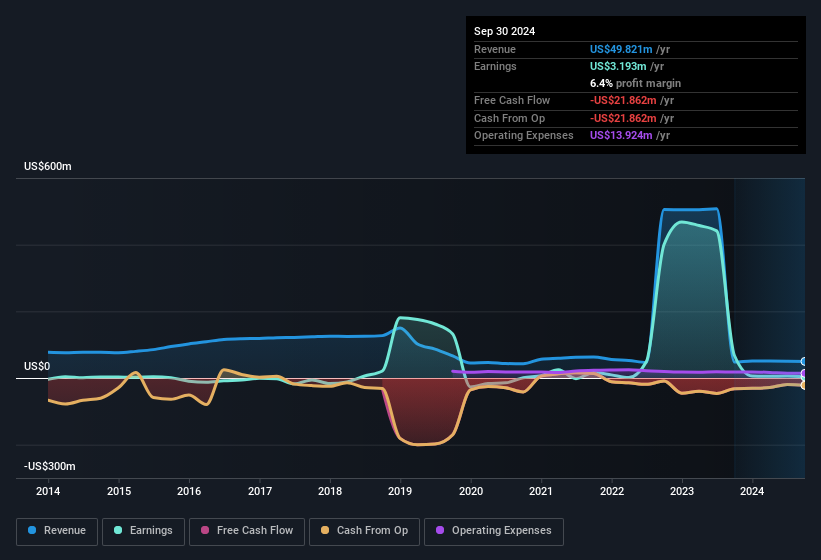- United States
- /
- Real Estate
- /
- NYSE:TCI
Transcontinental Realty Investors' (NYSE:TCI) Soft Earnings Are Actually Better Than They Appear

Shareholders appeared unconcerned with Transcontinental Realty Investors, Inc.'s (NYSE:TCI) lackluster earnings report last week. Our analysis suggests that while the profits are soft, the foundations of the business are strong.
View our latest analysis for Transcontinental Realty Investors

The Impact Of Unusual Items On Profit
To properly understand Transcontinental Realty Investors' profit results, we need to consider the US$2.1m expense attributed to unusual items. While deductions due to unusual items are disappointing in the first instance, there is a silver lining. When we analysed the vast majority of listed companies worldwide, we found that significant unusual items are often not repeated. And that's hardly a surprise given these line items are considered unusual. Transcontinental Realty Investors took a rather significant hit from unusual items in the year to September 2024. All else being equal, this would likely have the effect of making the statutory profit look worse than its underlying earnings power.
Note: we always recommend investors check balance sheet strength. Click here to be taken to our balance sheet analysis of Transcontinental Realty Investors.
Our Take On Transcontinental Realty Investors' Profit Performance
As we mentioned previously, the Transcontinental Realty Investors' profit was hampered by unusual items in the last year. Based on this observation, we consider it possible that Transcontinental Realty Investors' statutory profit actually understates its earnings potential! Unfortunately, though, its earnings per share actually fell back over the last year. The goal of this article has been to assess how well we can rely on the statutory earnings to reflect the company's potential, but there is plenty more to consider. With this in mind, we wouldn't consider investing in a stock unless we had a thorough understanding of the risks. You'd be interested to know, that we found 2 warning signs for Transcontinental Realty Investors and you'll want to know about them.
Today we've zoomed in on a single data point to better understand the nature of Transcontinental Realty Investors' profit. But there is always more to discover if you are capable of focussing your mind on minutiae. For example, many people consider a high return on equity as an indication of favorable business economics, while others like to 'follow the money' and search out stocks that insiders are buying. While it might take a little research on your behalf, you may find this free collection of companies boasting high return on equity, or this list of stocks with significant insider holdings to be useful.
Valuation is complex, but we're here to simplify it.
Discover if Transcontinental Realty Investors might be undervalued or overvalued with our detailed analysis, featuring fair value estimates, potential risks, dividends, insider trades, and its financial condition.
Access Free AnalysisHave feedback on this article? Concerned about the content? Get in touch with us directly. Alternatively, email editorial-team (at) simplywallst.com.
This article by Simply Wall St is general in nature. We provide commentary based on historical data and analyst forecasts only using an unbiased methodology and our articles are not intended to be financial advice. It does not constitute a recommendation to buy or sell any stock, and does not take account of your objectives, or your financial situation. We aim to bring you long-term focused analysis driven by fundamental data. Note that our analysis may not factor in the latest price-sensitive company announcements or qualitative material. Simply Wall St has no position in any stocks mentioned.
About NYSE:TCI
Transcontinental Realty Investors
A Dallas-based real estate investment company, holds a diverse portfolio of equity real estate located across the U.S., including office buildings, apartments, shopping centers, and developed and undeveloped land.
Adequate balance sheet very low.
Market Insights
Community Narratives




